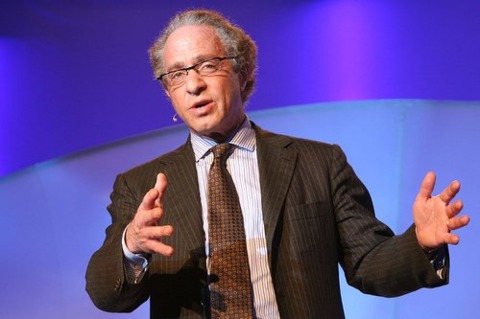GDC '08: 'The future, Ray?'
Renowned inventor and futurist Ray Kurzweil explains how computer technology will give people superhuman abilities and near immortality.
This year's Game Developers Conference featured two keynote addresses. The first, Microsoft's Wednesday keynote, was all about games, specifically Gears of War 2, Ninja Gaiden 2, and Fable 2. Despite the second keynote's title--"The Next 20 Years of Gaming"--games played only a very small part in the presentation, which nonetheless kept the crowd hanging on every word.

Delivered by inventor and futurist Ray Kurzweil, the keynote centered on the idea that Moore's Law, which describes the exponential growth of computing capabilities for cutting-edge hardware. As chips are progressively able to perform more calculations for less money, and in a package that's continually shrinking, Kurzweil said he expects to see the price-to-performance ratio of computers improve a billionfold in the next 25 years. The devices will eventually become small enough, Kurzweil said, that scientists can create fake blood cell-size computers to perform the same functions of natural blood cells.
"But I'm getting a little ahead of myself," the futurist joked.
Modern electronics are so powerful, Kurzweil said, that other fields that rely on them will be subject to advancements at the same pace as the chips that power them. With hardware that powerful, the limiting factor on what can be done with it becomes the software.
"You can't ignore the exponential projections," Kurzweil said. "If you're programming a game or any type of information-based technology for two or three years from now, the world's going to be completely different."
One of Kurzweil's biggest successes as an inventor was a 1979 print-to-speech reading device that was about the size of a washing machine and would "read" text on paper for the visually impaired. Given the advance of technology, Kurzweil knew that the technology would become smaller and more powerful, eventually allowing for a handheld print-to-speech reading machine that blind people could carry with them to read newspapers, menus, street signs, or anything else they pointed at.
In 2002 he estimated that the necessary hardware for the handheld unit would be ready in mid-2006, and that it would take four years to write the complex software that could identify various fonts and cursive writing from different angles and in all the conditions such a handheld would be used.
Kurzweil began working on the software for the device in 2002, even though he didn't think it would be feasible for another four years. He eventually met his projection in the summer of 2006 with a portable unit he admitted was cumbersome. Less than two years after that model was produced, Kurzweil now has the entire thing working on a standard-size, feature-packed cell phone. He pulled out a prototype and had it read a passage about advancing artificial intelligence that impressed the crowd and drew a round of hollers and applause.
Touching on the topic of the convention, Kurzweil said developers should be developing ahead of the curve in the same fashion, considering the constantly changing face of game technology.
Returning to the notion that exponential growth in the power of computer devices will affect everything else, Kurzweil explained how previously unrelated fields will essentially become information technology fields. For instance, in the field of medicine, an artificial red blood cell called a respirocyte could eventually duplicate the work of the real thing, but with 1,000 times the efficiency.
"Biology is very capable and intricate and clever," Kurzweil said, "but it's also very suboptimal compared to what we ultimately can build with information technology and nanotechnology... If you were to replace a portion of your blood with these respirocytes, you could do an Olympic sprint for 15 minutes without taking a breath or sit at the bottom of your pool for four hours."
Kurzweil also believes nanotechnology will solve the world's energy crisis within two decades. Solar panels are hard to manufacture, heavy, inefficient, and expensive, but Kurzweil said the advent of nanoengineered solar panels will change that. Within five years, he believes those high-tech solar panels will become less expensive per watt of energy produced than oil, taking away the financial incentive for people to burn through nonrenewable natural resources. Within 20 years, they will have largely replaced fossil fuels as the primary source of the world's energy.
In a more general view, Kurzweil noted that the average life expectancy was growing at the rate of roughly three months a year. Now that information technology is affecting medicine, Kurzweil projected that in 15 years, the life expectancy of people will start expanding at the rate of more than a year for every year that passes, essentially not just delaying off death, but actually pushing it further away with each passing day.
"We didn't stay on the ground," Kurzweil said. "We didn't stay on the planet. And we have not stayed within the limitations of our biology."
Got a news tip or want to contact us directly? Email news@gamespot.com
Join the conversation